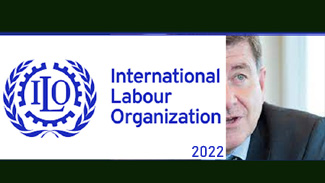
The ILO’s World Employment and Social Outlook Trends 2022
In a press conference yesterday, the Director General of International Labour Organization (ILO) Guy Ryder presented the report The ILO’s World Employment and Social Outlook Trends 2022.
Guy Ryder said that there can be no real recovery from this pandemic without a broad-based labour market recovery. « And to be sustainable, this recovery must be based on the principles of decent work – including health and safety, equity, social protection and social dialogue. »
While this latest projection is an improvement on the situation in 2021, it remains almost two per cent below the number of global hours worked pre-pandemic.
Global unemployment is expected to remain above pre-COVID-19 levels until at least 2023. The 2022 level is estimated at 207 million, compared to 186 million in 2019. The ILO’s report also cautions that the overall impact on employment is significantly greater than represented in these figures because many people have left the labour force. In 2022, the global labour force participation rate is projected to remain 1.2 percentage points below that of 2019.
The effects are being felt in labour markets in all regions of the world, although a great divergence in recovery patterns can be observed. The European and the North American regions are showing the most encouraging signs of recovery, while South-East Asia and Latin America and the Caribbean have the most negative outlook. At the national level, labour market recovery is strongest in high-income countries, while lower- and middle-income economies are faring worst. The report warns of the stark differences in the impact the crisis is having across groups of workers and countries. These differences are deepening inequalities within and among countries and weakening the economic, financial and social fabric of almost every nation, regardless of development status. This damage is likely to require years to repair, with potential long-term consequences for labour force participation, household incomes and social and – possibly – political cohesion.
FM Geneva 17 January 2021





